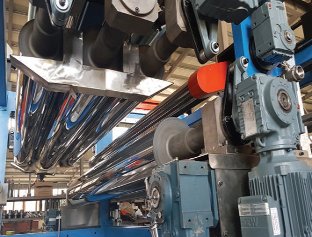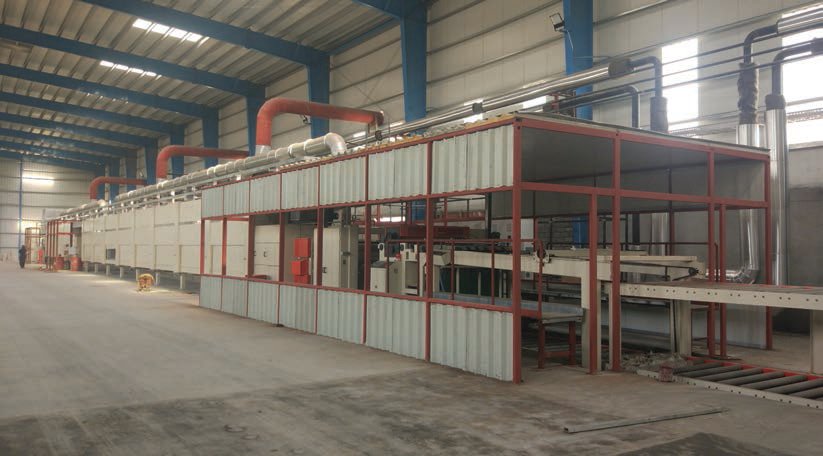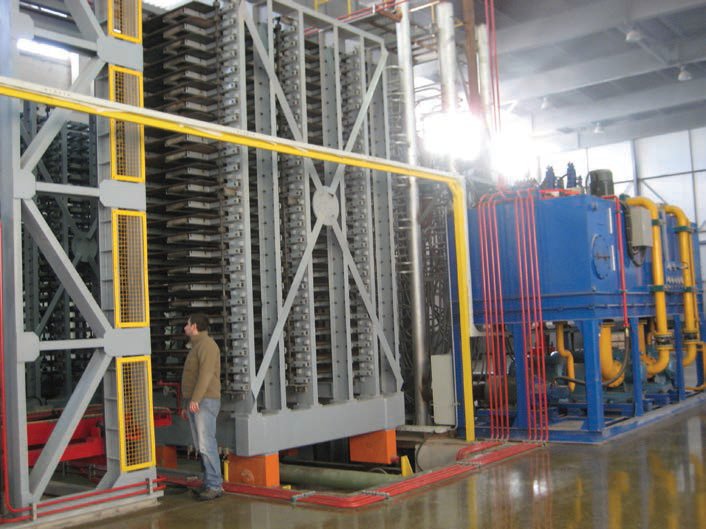A new technology
15 November 2018Longoni Roberto e figli srl operates in the field of the manufacturing components for the furniture and building industry, particularly plastic decorative laminates, particleboard and panels coated with melamine papers or foils
Known simply as Longoni, this company is based in Monza in northern Italy, a town perhaps most famous for its Grand Prix motor racing circuit.
Founded by Roberto Longoni, who still heads up the company, Longoni’s core business has always been in high pressure lamination (HPL) and short-cycle lamination (SCL).
For the past 15 years, Longoni has been in what it calls a “tight cooperation” with NTST, a Chinese company based in Nantong, Jiangsu Province, China. This company is a major manufacturer of machinery for the wood processing industry and produces high-quality one-step and two-step impregnation lines for melamine, urea and phenolic impregnation.
“The latest design of lines from NTST is proving very successful and the lines are very, very close to European-made machines, but at a more affordable price,” said Ludovico Longoni, son of the founder and sales manager of the company.
“We have also developed new designs for coating lines, producing new products which have proved very popular on the market,” he continued. “These are mainly liquid overlay applications and light acrylic coatings used to produce very lightweight CPL [continuous pressure laminate]. These are particularly popular on the Middle Eastern and Asian markets.”
Trying not to give too much away, Mr Longoni also said that the company is working with “the leading HPL manufacturer in the world”, which is equipping all its factories with Longoni’s new lines. That contract must have been quite a coup, one imagines.
“These lines were developed 100% inhouse combining the needs of the customer with the abilities of the lines. “Some might regard HPL as a ‘mature’ product, reaching the end of its life cycle, but that is not so. We are receiving fresh enquiries for capacity expansions all the time,” said the sales manager. “In fact, we are producing an HPL press for a customer in Malaysia right now as he wishes to expand his capacity. Saudi Arabia has many investments under way and Egypt is also building a few new HPL factories, while Turkey is another big manufacturer of this product.”
In 2017, Longoni sold its first singleopening HPL press to Iran. I asked Mr Longoni if that was a problem due to sanctions? “It is not easy to sell to Iran but it is still possible, though we must await the result of US sanctions due in November 2018,” he said. Not forgetting short-cycle lamination, Longoni is also currently installing a plant in Egypt for SCL. Most of that line is coming from NTST, with the energy plant coming from an Italian manufacturer. “We give the customer the full package with the machinery from China matched with that from Italy and we organise all the installation of the complete plant as well. It is our technicians who start up the line,” said Mr Longoni. “We are totally responsible for a successful start-up and offer full guarantees, etcetera. We also offer all the know-how for the production of the resins.”
Mr Longoni went on to say that he had shown samples of decor papers from a Bangladesh customer to European manufacturers and they admitted that the quality was the same. “You can produce the right quality anywhere if you follow the right steps,” he said.
Longoni supplies all the raw materials, such as printed papers, aluminium foils, chemical additives and press plates. The latter are sourced from Italian company Flai srl.
“Melamine and phenolic resins are not too expensive and you get good, durable products. Corian, granite, or marble worktops all have their place in the market, but they are a lot more expensive. “Compact laminate is also becoming more popular and is increasingly used in table tops, especially in a commercial environment.”
Longoni also supplies paper impregnation lines for decorative and Kraft papers and Mr Longoni said that the company can offer real-life examples of Kraft paper lines which are running at 100m/minute.
REVOLUTIONARY DRY SYSTEM
However, the latest technology on which Longoni is currently working is its LamiDry system, which is revolutionary and has a new patent.
The principle is to substitute the wet impregnation of decor paper with a dry treatment by powder resin. This process is currently under test.
“we have a pilot line in Italy working in cooperation with the Chemisol company, which helped us to develop the powder resin,” said Mr Longoni. “Now we are working on the industrialisation and implementation of the dry resin and testing its interaction with corundum.”
He explained that although the dry resin still has to be produced from wet resin, it is dried much more efficiently than it would be in a conventional wet resin impregnation line.
“This also means that the emissions are the problem of the resin supplier, not the company running the dry resin impregnation line – and the air treatment equipment for those lines costs millions of euros.
“We are already in discussions with customers and have the pilot line running at Chemisol,” said Mr Longoni.
Now Longoni is looking for a partner to make the major step into industrial production and is in discussions with several producers, large and small.
What about the costs versus a conventional line and the cost of replacement of such a line, I ask? “It does require a new line, but that is a third of the length of a conventional ‘wet’ line and doesn’t require the cost of the dryers, a resin plant, or the emissions cleaning equipment,” said Mr Longoni.
He pointed out another advantage of the dry resin process: the decor paper will not expand as it doesn’t get wet, therefore embossing-in-register is easier, as paper expansion does not have to be allowed for.
“This concept could be a complete revolution for the industry,” enthused the sales manager. “You could start with a dry line beside an existing conventional liquid resin line, using each for different products. The wet process has been around for over 80 years. It’s time for a new approach.
“We offer full training for customers’ staff, as well as technology transfer and we can supply onsite support for two months, three months, or a even year if necessary,” said Ludovico Longoni.
From a modest suite of offices in central Monza, Longoni reaches out around the world in its development and supply of technology and expertise for the laminating industry.




